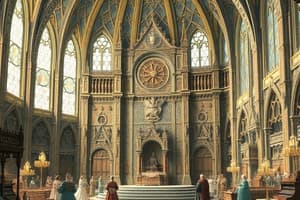Podcast
Questions and Answers
What was the Catholic Counter Reformation?
What was the Catholic Counter Reformation?
- Roman Catholic Church attempted to reform itself. (correct)
- Jesuits: Catholic missionaries who travel throughout the world. (correct)
- Catholics executed heretics and burned Protestant bibles. (correct)
- None of the above.
What major action did the Council of Trent take in 1545?
What major action did the Council of Trent take in 1545?
Ended indulgences and improved training of priests.
What were some results of the Reformation?
What were some results of the Reformation?
- Protestant thinking continues to spread.
- Catholic Church weakened.
- Religious wars and persecution divided Europe.
- All of the above. (correct)
What occurred between 1562-1598 in France?
What occurred between 1562-1598 in France?
What was the outcome of the St. Bartholomew's Day Massacre?
What was the outcome of the St. Bartholomew's Day Massacre?
Match the following terms with their definitions:
Match the following terms with their definitions:
Flashcards are hidden until you start studying
Study Notes
Catholic Counter Reformation
- The Roman Catholic Church initiated self-reform to address criticisms raised during the Protestant Reformation.
- Jesuits emerged as key missionaries, promoting Catholicism globally and focusing on conversions.
- The Church actively persecuted heretics, including the execution of individuals and the destruction of Protestant literature through the Inquisition.
Council of Trent: 1545
- The Council abolished the sale of indulgences, a significant financial practice previously exploited by the Church.
- Enhanced priest training was implemented to ensure a better-informed clergy.
- Established a code of conduct for clergy to improve moral and ethical standards.
- Affirmed that only the Pope and the Church had the authority to interpret the Bible, maintaining services in Latin.
Results of the Reformation
- Protestant ideologies continued to gain traction, resulting in a weakened position for the Catholic Church.
- The divide between Christians led to ongoing religious wars and widespread persecution throughout Europe.
Civil Wars in France (1562-1598)
- A series of civil conflicts erupted between Catholics and Protestants, fundamentally altering the religious landscape.
- The St. Bartholomew's Day Massacre saw the massacre of approximately 3,000 Protestants, highlighting the intense sectarian violence.
- Resulted in a lasting religious divide: Northern Europe largely adopted Protestantism while Southern Europe remained predominantly Catholic.
Studying That Suits You
Use AI to generate personalized quizzes and flashcards to suit your learning preferences.




